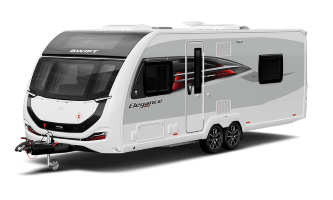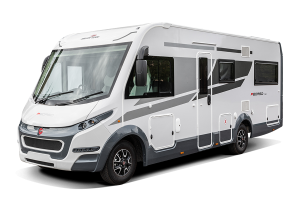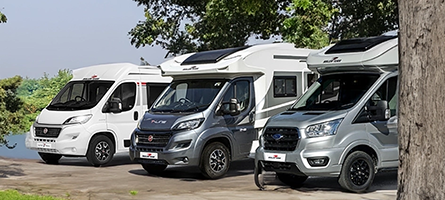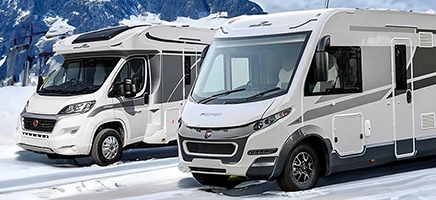
Motorhome vs Caravan Costs
A brand-new caravan is typically more budget-friendly compared to a new motorhome. However, when you factor in the need for an appropriate towing vehicle, the costs become more comparable. It's worth noting that this assessment primarily pertains to new vehicles, but there are opportunities for cost savings when considering used motorhomes and cars.
In terms of depreciation, caravans tend to lose value more rapidly, at an estimated annual rate of around 15%, as opposed to motorhomes, which depreciate at a more modest rate of approximately 5% annually, provided you maintain low mileage.
When it comes to ongoing expenses, operating a motorhome independently tends to be pricier than a caravan, which essentially incurs minimal operational costs. However, it's important to recognize that a caravan depends on a car for towing, which means you'll need to cover costs such as car insurance, tax, and an MOT. It's worth noting that you won't encounter the additional expenses associated with full-time insurance when opting for a caravan.
On the subject of fuel efficiency, both a car towing a 3,500kg caravan and a 3,500kg motorhome tend to achieve similar miles per gallon, averaging between 20-30mpg. The specific figures can vary based on the make and model of the vehicles and whether they are fully loaded.
Motorhome vs Caravan - let battle commence
The Pros & Cons
Pros:
Cost-Effective:
One of the most significant advantages of caravans is their affordability. Caravans are generally cheaper to purchase than motorhomes. Since caravans lack an engine, there are no associated costs for engine maintenance or build expenses. For the price of a new, high-spec caravan, which typically falls within the £30-40k range, you could potentially acquire a twelve-year-old German-made motorhome with approximately 30,000 kilometers on the odometer. However, it's essential to consider that this cost comparison might become less favorable if you also need to invest in a suitable towing vehicle for your caravan.
Spacious Living:
Caravans typically offer more habitation space compared to motorhomes of the same length. This is because the measurements for a motorhome must include the engine and driver's cab, which reduces the overall usable living space. Caravans, being free from these components, allow for a more spacious and comfortable interior.
Flexibility:
Owning a caravan requires a suitable towing vehicle, but this can be advantageous. Once you've unhitched your caravan at a campsite, you have a separate vehicle at your disposal for sightseeing and exploration. This dual-vehicle setup provides you with more mobility and the convenience of having a vehicle for excursions without needing to pack up your living space.
License Requirements:
If you obtained your driver's license before 1997, you have the advantage of not needing a special driving license to operate a motorhome or tow a caravan. However, for those who passed their driving test after January 1, 1997, there are restrictions. You are limited to a combined maximum allowable mass of 3,500kg for the towing vehicle and caravan. For anything heavier, you would need to obtain a category B+E driving license, which can be seen as a potential drawback.
Cons:
Towing Vehicle Requirement:
While having a towing vehicle can be advantageous, it is also a necessity. You need an appropriate towing vehicle to transport your caravan. This requirement means an additional expense and potentially having to purchase a specific type of vehicle if you don't already own one.
Additional Expenses:
The initial cost of a caravan might be lower, but you should consider the expenses associated with maintaining and insuring both the caravan and the towing vehicle. This can add up and impact the overall cost-effectiveness.
Setup Time:
Setting up a caravan at a campsite can be time-consuming. It involves unhitching, leveling, and connecting utilities. This setup process can be less convenient than the relatively quicker access provided by motorhomes.
Limited Mobility:
While a separate towing vehicle offers mobility, it can also be cumbersome. Maneuvering a large caravan or motorhome in certain areas, such as narrow roads or crowded campsites, can be challenging and limit your travel options.
License Restrictions:
For individuals who obtained their driver's license after 1997, the requirement to take a category B+E driving test to operate heavier caravans or motorhomes can be viewed as a potential drawback. This may involve additional time, effort, and expense to meet the necessary license requirements.
In conclusion, the choice between a caravan and a motorhome comes down to individual preferences, budget, and specific travel needs. Each option offers a unique set of advantages and disadvantages that should be carefully considered before making a decision.

The Pros & Cons
Pros:
Luxurious Options:
When searching for motorhomes for sale, you'll discover a wide range of luxurious choices, from aerodynamic A-class motorhomes with all the latest features to more basic models. The variety allows you to find a motorhome that suits your preferences and budget. However, it's worth noting that even a basic campervan can be relatively expensive.
Compact and Flexible:
Campervans and small motorhomes offer a compact living space that's great for those who value mobility. However, this can sometimes mean compromising on fixed beds or living area, especially if you're budget-conscious.
Travel Convenience:
While it might not be as spontaneous as van life, motorhomes offer a convenient way to explore. You can pack up and move to new destinations without the hassle of packing and unpacking each day. Some motorhomes even have a tow car or scooter, providing additional transportation options.
License Requirements:
The license you need to drive a motorhome depends on its weight. This means you have flexibility based on your existing license or your willingness to upgrade it. Larger motorhomes may require a Category C license, but smaller ones are accessible with a standard driver's license.
Driving Stability:
Though larger motorhomes can be challenging to drive initially, they become easier to handle with experience. Features like a tag axle improve stability, especially on highways.
Wild Camping Opportunities:
Motorhomes offer the freedom of wild camping. In many parts of Europe, it's relatively easy to find service points for motorhomes, allowing for off-grid living without the need for campgrounds. This can be cost-effective and adventurous.
Garage Space:
Some motorhomes come with ample garage space, accommodating not just scooters but also additional equipment, such as portable washing machines, chairs, and tables. This extra storage space can be a significant advantage for long journeys.
Water and Waste Tanks:
Motorhomes typically have large fresh and grey water tanks, providing the convenience of extended use without frequent refills and disposal. However, maintaining the grey tank can be a bit unpleasant.
Quick Set-Up and Relocation:
Setting up a motorhome for living can be relatively quick, especially if you're connected to utilities. This allows for spontaneous moves, even when wild camping.
Cons:
Expensive Insurance:
Motorhome and campervan insurance can be costly, particularly for vehicles valued over £65k. Full-time van living requires specialized insurance, adding to the overall expense of owning a motorhome. You also need to consider vehicle tax and MOT costs, leading to ongoing financial commitments.
Non-Cool Factor:
While van life has gained a certain "cool" image, owning a motorhome or campervan is distinct from this trend. It's essential to recognize that these vehicles are designed for comfort and convenience rather than an alternative lifestyle.
Limited Living Space:
One significant trade-off in smaller motorhomes is limited living space, which can feel cramped for extended periods. Balancing the need for living space and fixed beds can be a challenge, especially for budget-conscious buyers.
Constant Movement:
The convenience of traveling with a motorhome means that you must relocate each time you want to explore, making day trips less spontaneous. Finding parking spots can also be a task, depending on your destination.
License Limitations:
License requirements may limit the size and type of motorhome you can drive. For larger models, a Category C license is necessary, which can be restrictive for some buyers.
Initial Driving Challenge:
Handling larger motorhomes can be intimidating at first, requiring a learning curve. While a tag axle can improve stability, it's not a solution for everyone.
Garage Space Compromises:
Having a large garage often means sacrificing a rear lounge layout. If you're set on a particular interior configuration, you might not get the garage space you desire.
Maintenance Tasks:
Motorhomes require regular maintenance, including cleaning and servicing the grey water tank, which can be unpleasant. This upkeep can be a drawback for some users.
In summary, motorhomes and campervans offer a unique and comfortable way to travel and live on the road, but they come with various pros and cons that potential buyers should consider before making a decision. The choice between the two also depends on your personal preferences and travel style.

Motorhome:
Pros:
Spacious Living:
Motorhomes typically offer more living space with various amenities, including kitchen, bathroom, and separate sleeping areas.
Convenience:
They come fully equipped with essential amenities, reducing the need to set up and dismantle camp frequently.
Comfort:
Motorhomes often provide a higher level of comfort with larger beds, comfortable seating, and climate control systems.
Storage:
They offer ample storage space for belongings, outdoor gear, and equipment.
Amenities:
Some motorhomes have luxuries like entertainment systems, larger kitchens, and spacious bathrooms.
All-Weather Camping:
Motorhomes are suitable for year-round camping as they offer better insulation and climate control options.
Cons:
Cost:
They are usually more expensive to purchase, operate, and maintain.
Size and Maneuverability:
Their larger size can make them more challenging to drive, park, and navigate on narrow roads.
Fuel Efficiency:
Motorhomes tend to have lower fuel efficiency compared to campervans.
Camping Locations:
Limited access to remote or smaller campsites due to their size.
Campervan:
Pros:
Maneuverability:
Campervans are easier to drive, park, and navigate in urban areas and tight spaces.
Fuel Efficiency:
They are more fuel-efficient, making them cost-effective for long journeys.
Versatility:
Campervans can double as everyday vehicles, reducing the need for a separate car.
Simplicity:
Campervans are easier to set up and pack away, ideal for spontaneous trips.
Access:
They can reach more remote and smaller campsites due to their compact size.
Affordability:
Campervans are generally more affordable to purchase and maintain.
Cons:
Limited Space:
Campervans have less interior space, which can feel cramped on extended trips.
Amenities:
They may have fewer amenities and a smaller kitchen and bathroom.
Sleeping Arrangements:
Sleeping areas may be less comfortable or smaller.
Storage:
Limited storage space for gear and equipment.
Comfort:
Less room for relaxing and socializing indoors during inclement weather.
Your choice between a motorhome and a campervan should depend on your specific needs, preferences, and travel style. Consider factors like your budget, the number of travelers, the locations you plan to visit, and the level of comfort and amenities you desire when making your decision.

A-Class Motorhomes:
Pros:
Spacious and Luxurious:
A-class motorhomes are typically more spacious and luxurious, offering the most interior living space and high-end amenities.
Integrated Cab:
The driver's cab is part of the living space, making it more convenient for passengers to move between the driving and living areas.
Better Visibility:
The elevated driving position provides excellent visibility, especially on the road and in scenic areas.
Driving Comfort:
A-class motorhomes often have more comfortable and adjustable driver and passenger seats.
Stylish Design:
They often have a sleek and stylish exterior design.
Higher Resale Value:
Due to their premium features and design, A-class motorhomes tend to retain their value better over time.
Cons:
Cost:
A-class motorhomes are typically more expensive to purchase and maintain.
Fuel Consumption:
They have larger engines and can be less fuel-efficient, leading to higher operational costs.
Size and Maneuverability:
Their larger size can make them more challenging to drive, park, and navigate on narrow roads.
Limited Campsite Access:
Some smaller or more remote campsites may not accommodate A-class motorhomes due to their size.
C-Class Motorhomes:
Pros:
Cost-Effective:
C-class motorhomes are generally more affordable to purchase and operate.
Maneuverability:
They are easier to drive, park, and navigate in urban areas and tight spaces.
Amenities:
C-class motorhomes often have a comfortable living space with essential amenities like a kitchen, bathroom, and sleeping areas.
Decent Fuel Efficiency:
They tend to have better fuel efficiency than A-class motorhomes.
Access to Smaller Campsites:
Their compact size allows them to access smaller and more remote campsites.
Lower Maintenance Costs:
Maintenance and repair costs are typically lower for C-class motorhomes.
Cons:
Interior Space:
C-class motorhomes have less interior space than A-class motorhomes, which can be limiting on long trips or with larger groups.
Bed Configuration:
The sleeping areas may be less flexible or comfortable than those in A-class motorhomes.
Visibility:
The driver's cab is separate from the living area, and the visibility may not be as good as in an A-class motorhome.
Resale Value:
C-class motorhomes may not retain their value as well as A-class motorhomes due to their lower initial cost and less luxurious features.
Your choice between an A-class and C-class motorhome should be based on your specific preferences, budget, and travel needs. Consider factors like the number of passengers, desired amenities, and where you plan to travel when making your decision.


